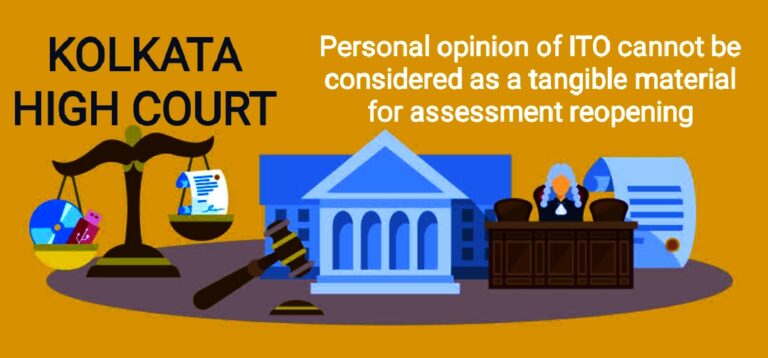Kolkata High Court Ruling: Personal Opinion of Income Tax Officer is not enough for Assessment Reopening
In a recent landmark judgment on November 17, 2023, the Kolkata High Court ruled against the reopening of assessments solely based on the personal opinion of an Income Tax Officer (ITO). This significant decision in the case of Dinesh Kumar Goyal HUF vs. ITO underscores the importance of concrete evidence and adherence to procedural requirements in such matters.
Background of the Case:
The legal dispute arose from a challenge to an order issued under Section 148A(d) of the Income Tax Act, 1961, dated August 4, 2023, relating to the assessment year 2017-18. The assessing officer had initiated the reopening based on information obtained through the insight portal regarding cash deposits, interest receipts, and debenture purchases.
Legal Proceedings:
The appellant contested the reopening based upon the personal opinion of the ITO, arguing a lack of tangible material supporting the claim of income escapement. The court observed that a prior order had already quashed reopening proceedings for the assessment year 2016-17, and the current notice failed to provide substantive allegations beyond extracting particulars from the return of income.
Violation of Natural Justice:
The initial order under Section 148A(d) dated July 28, 2023, faced challenges for violating principles of natural justice. The writ petition (WPA 20671 of 2022) resulted in the court remanding the matter to the assessing officer for fresh consideration. The subsequent impugned order led to the current appeal.
Court’s Analysis:
Upon careful examination of the August 4, 2023 order, the court identified glaring omissions. Notably, the assessing officer referred to the need to verify bank statements for the financial year 2015-16, despite the quashing of proceedings for the assessment year 2016-17. The court deemed this a critical oversight.
Furthermore, the court highlighted the assessing officer’s statement that “no prudent businessman” would engage in certain financial transactions, characterizing it as a personal opinion rather than tangible material necessary for reopening an assessment.
Legal Precedents:
The court distinguished the case from a precedent (Shri Shyam Sundar Dhanuka v. Union of India) cited by the department, emphasizing the dissimilarity in factual circumstances. Additionally, the court referred to the decision in the case of LARCT, clarifying the scope of Section 148A and asserting that the writ court would not ordinarily interfere unless glaring omissions or non-compliance with conditions precedent were evident.
Order of the Court:
The Kolkata High Court upheld the appeal and writ petition, thereby quashing the August 4, 2023 order under Section 148A(d) and the consequential notice under Section 148. The court stressed the necessity of tangible material and compliance with legal procedures when reopening assessments, stating that the personal opinion of an assessing officer alone is insufficient.
To Read About New Functionality of “Discard return” in Income Tax CLICK HERE
Read More
Employee Not Liable for Employer’s TDS Failures: Delhi High Court Order Dt.29.11.23
Income Tax Department to Move SC against Ruling of Delhi HC on Validity of Orders Without DIN
